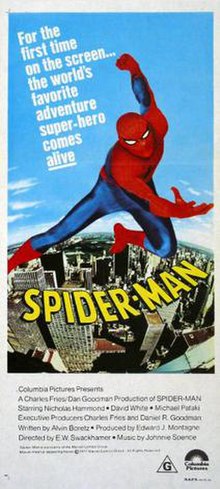Spider-Man (1977 film)
| Spider-Man | |
|---|---|

United Kingdom theatrical release poster
|
|
| Directed by | E. W. Swackhamer |
| Produced by |
Charles W. Fries Daniel R. Goodman Edward J. Montagne |
| Written by | Alvin Boretz |
| Based on |
Spider-Man by Stan Lee Steve Ditko |
| Starring |
Nicholas Hammond David White Michael Pataki Lisa Eilbacher |
| Music by | Johnnie Spence |
| Cinematography | Fred Jackman |
| Edited by | Aaron Stell |
|
Production
companies |
Danchuck Productions
Marvel Television |
| Distributed by | Columbia Pictures |
|
Release date
|
|
|
Running time
|
90 minutes |
| Country | United States |
| Language | English |
Spider-Man is a 1977 American live-action made-for-television superhero film that had a theatrical release abroad, which serves as the pilot to the 1978 television series titled The Amazing Spider-Man. It was directed by E. W. Swackhamer, written by Alvin Boretz and stars Nicholas Hammond as the titular character, David White, Michael Pataki, Jeff Donnell and Thayer David.
Peter Parker (Nicholas Hammond), a freelance photographer for the Daily Bugle, is bitten by a radioactive spider and discovers he has gained superpowers, such as super-strength, agility and the ability to climb sheer walls and ceilings. When a mysterious Guru (Thayer David) places people under mind-control to rob banks and threatens to have ten New Yorkers commit suicide at his command unless the city pays him $50 million, Peter becomes the costumed hero Spider-Man to stop the crook's fiendish scheme. Things take a bad turn when the villain hypnotizes Peter Parker into being one of the ten people to jump off a building on command.
The famed sequence in which Spider-Man crawls across an office ceiling and jumps to the wall was accomplished using a complex set of rigging and cables hidden in tracks in the ceiling. Stunt grips lifted stuntman/stunt coordinator Fred Waugh to the ceiling, and he then scuttled down the hallway using a slider track while the wire pressure pulled him upwards. The scene in which Spider-Man swings from building-to-building was extremely expensive and dangerous, and required two days of rigging; to avoid having to repeat this, the stunt was filmed from multiple camera angles to create extra footage which could be used in future episodes of the TV series.
...
Wikipedia
